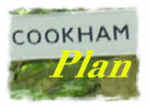
The Cookham Plan
Findings and Recommendations
Housing and Development Group
9. HOUSING PROVISION FOR THE ELDERLY AND DISABLED
| MAIN REPORT INDEX | HOUSING PROVISION INDEX |
9 HOUSING PROVISION FOR THE ELDERLY AND DISABLED
9.1 Remit
Consider the adequacy of housing provision for elderly and disabled people, whether this is being lost to redevelopment and how to ensure adequate future provision.
9.2 Concerns
During the consultation phase, a number of people expressed concern that there was inadequate housing provision for elderly and disabled people in Cookham and that suitable private accommodation (such as bungalows) was being lost to more intensive redevelopment.
9.3 Sheltered Housing Stock
MDHA have provided the following analysis of their sheltered accommodation in Cookham:
Figure 9-1 MDHA Sheltered Accommodation in Cookham

In addition, there are three private nursing homes in Cookham providing more intensive care. Cookham Riverside in Berries Road provides 35 bedrooms, Harwood House in Spring Lane has 30 bedrooms and Moor Cottage in the High Street has 13 bedrooms.
9.4 Demand
Across the borough there is strong demand for sheltered accommodation as evidenced by the current waiting list (see Figure 9-2). This is borne out by evidence from the questionnaire:
-
214 respondents (33%) of respondents thought sheltered homes were needed.
-
57 respondents (9%) of respondents thought that homes for people with disabilities were needed.
-
19 respondents cited a lack of suitable sheltered accommodation as an obstacle to them moving within Cookham.
Figure 9-2 Current Waiting List for Sheltered Accommodation

The working group have undertaken research in order to estimate the level of demand which may be expected from a population with the size and demographic make up of Cookham. This work is described in Appendix 3 and it suggests that:
-
Based on the 2001 census and a provision of 6 units per 1,000 people over 65, Cookham’s population needs 6 sheltered housing units.
-
Projected forward over 20 years, it is possible that local demand could grow to 13 units.
9.5 Community Housing
The new Core Strategy within the LDF identifies this type of accommodation as being important. RBWM have developed Policy CS17 – Housing the Community which states that:
1. New housing developments will be required to provide a mix of tenure, size and type to meet the needs of all sectors of the community, including affordable housing, vulnerable groups and those with special needs
9.6 Key Findings
-
We note that all of the current provision for sheltered housing is in the public sector and we consider that there may be an unfulfilled demand for private sheltered accommodation. If all Cookham’s future needs were to be met by the private sector, this would require development of a maximum of 13 units.
-
If local people are given fair access then there is *no case for building more social sheltered accommodation in Cookham.
-
The exact level of need for other forms of supported accommodation is unclear but, given that there is no current provision, construction or conversion of a small number of units may be justified.
-
Consideration should be given to whether the current types of accommodation meet residents needs. In particular, do they provide a transition from less to greater dependency and do they allow couples to remain together?
9.7 Action Plan
Ref
Proposal Purpose
Responsibility
Drafting
Sub-Committee note:
In November 2007, Elizabeth House produced the following statistics on the local population:
Current
population of the three Cookhams: c6000 people
Over 75s: c (circa) 800 people (13% of population) c40% male, 60% female
Over 85s: c250+ people
Over 90s: c130+ people
Forecast
growth by 2016:
Over 75s to increase by 15%+
Over 90s to increase by 40%+
National statistics suggest an 87% increase in the number of 85 year-olds in the next 20 years.
Over 75s living alone: 200 people
Of those on 4 or more medications (a measure of vulnerability to falls): 130 people